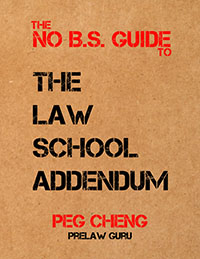 Optional Essays
Optional Essays
Most law schools offer applicants the opportunity to submit additional information about themselves in the form of optional essays. Although these essays are termed “optional,” it is actually in your best interest to submit any essay for which you can articulate a strong, well-drafted response that provides relevant additional information.
The most common two types of optional essays are: (1) a diversity statement and (2) a “Why ‘X Law School’?” essay. Some law schools may provide additional prompts to which you are permitted to respond. For example, in the 2020-21 application cycle, Georgetown Law offered applicants the choice among four prompts for an optional 250-word essay (e.g., “What would you tell your 14 year old self?”) as well as the option to submit a video statement in place of an essay. Michigan Law suggests 8 topics, and applicants are permitted to submit up to 2. Regardless of the nature of the essays, consider them an opportunity to round out your application and provide another writing sample.
“Part of what we value—and that we actually evaluate for—is capacity for good judgment. And one way to display good judgment is in the decision that one makes in what essays to submit, whether you do optional essays, whether you submit addenda, and whether those optional essays and addenda are actually useful to us.… [T]hese are invitations to submit information if you have something important to say. And really, it’s not at all expected, and it actually could be harmful to actually submit several addenda that speak to different issues, that really don’t provide much helpful information other than what’s there already.”
Bill Hoye, Associate Dean of Admissions, Duke University School of Law
A “diversity statement” is a common type of optional essay that encourages applicants to reflect on any personal diversity that they may contribute if selected as a member of the incoming class. The most important thing to realize is that “diversity” is interpreted broadly by law school admissions offices and is not limited to race or ethnicity. Diversity includes any element of your identity, circumstances, or experiences that you believe may give you a diverse perspective from fellow classmates or a different lens through which you view the world. Relevant types of diversity may include (but are not limited to) race, ethnicity, socioeconomic status, religious identification, sexual orientation, military experience, single parenting, nontraditional age, underrepresented major (e.g., STEM majors), or first-generation student status.
It is not, however, sufficient to merely identify a type of diversity. You should go one step further and articulate (1) how that diversity has impacted you personally and (2) why it may give you a unique perspective that enriches the law school class. It is not easy to articulate why your diversity matters, so it may take significant time to prepare a solid first draft. If you don’t feel that you have a meaningful type of diversity, then don’t submit a diversity statement. More importantly, don’t stress about not submitting a diversity statement! It is truly an optional statement and you will not be penalized for choosing not to submit one.
Many law schools offer applicants the opportunity to use a separate “Why ‘X Law School’?” essay in order to articulate specific reasons why the applicant believes the school would be a strong fit. Presumably, if you are applying to a school, there were reasons that led you to apply to that school above other similarly situated law schools. So if a school permits such an essay, you should make the effort to write one.
Start first by identifying your actual reasons for applying, then do more research.
What classes would you be most interested in taking?
What clinics interest you?
Does the school have a particular focus or philosophy that you appreciate (e.g., law and economics, law in action)?
Does the school place a significant number of graduates in the area in which you are most interested (e.g., public interest law, “big law”)?
Does it have smaller class sizes than the average law school?
By providing evidence of your strong interest in a school and of an appropriate fit, you can increase your likelihood of admission. So do your research, but don’t just regurgitate information from the website or other sources. Internalize the information, and reflect on why that information is important to you. If you truly can’t find something substantive to say about the school, reconsider applying there.
When Are Optional Essays a Bad Idea?
- DON’T submit an optional essay if you really have nothing to say about the topic. Admissions committees only want additional material that is helpful to them in evaluating your application.
- DON’T submit an optional essay if you aren’t willing to spend significant time drafting a strong essay. Admissions committees do not want you to go through the mechanical process of drafting and submitting materials without putting significant thought and effort into them.
- DON’T write a diversity statement unless you can articulate both (1) genuine diversity, and also (2) how your diversity has shaped you or how it will benefit your fellow classmates’ learning experience.
 Addenda
Addenda
An addendum is a brief, factual summary of the circumstances surrounding an element of your application that could raise a genuine question or concern for admissions committees. The personal statement and optional essays are not the place to address weaknesses in your application. Instead, you should use one or more addenda to provide context for any significant weaknesses in your application.
The following are common types of addenda:
• GPA addendum to address circumstances that contributed to a very low GPA in one particular class or during a certain semester or other defined period of time;
• LSAT addendum addressing multiple LSAT cancellations or a significant jump in LSAT score between two tests;
• Character and Fitness addendum addressing incidents of misconduct (required by most if not all schools);
• Absence addendum addressing a leave of 1+ semesters from college or a significant gap on your resume. Use good judgment when deciding whether an addendum is needed.
• Disruption grading addendum to explain SD/UD grades taken during the pandemic. For more information on SD/UD grading, see the Center for Pre-Law Advising’s Disruption SD/UD Grading guide for Law School Admissions.
When Are Addenda a Bad Idea?
- DON’T use addenda to address minor weaknesses. You risk drawing attention to weaknesses and making them seem more significant than they truly are.
- DON’T use an LSAT addendum to explain that you were scoring much higher on your practice tests. Law schools only care what happens on test day. But you may describe significant events that negatively impacted your test-day score.
- DON’T use an addendum to assign blame for misconduct or poor grades elsewhere. Explain the circumstances, take responsibility, then end on a positive note—briefly state what you learned from the situation.
How to Write Addenda with Examples
Excellent examples and step by step instructions for many types of addenda are available for free in the No B.S. Guide to The Law School Addendum by Peg Cheng on the Pre-Law Guru website.
Workshop Recording: Writing Addenda without Sacrificing Mental Health
The Writing Center gives some examples of addenda for law school applications that can be hard to write, and UHS joins us to talk about how to take care of your mental health when the law school application process is starting to impact you.

